We have a series here at the Autopian called “Phoning It In” where we like to highlight some delightfully half-assed solutions to automotive problems, usually the result of corporate penny-pinching or just impressive levels of notgiveashittery that were honed and perfected over many decades of automobile production. I was going to feature the Dodge L600 and L700 Tilt Cab Medium Duty Truck in that series, until I really started to think about it and realized it’s actually quite a brilliant solution to a problem. The motivations may be similar to what causes phoning it in – a lack of resources, a need to rapidly fill a hole in the market, and so on – but I think the result is just clever as opposed to the usual phoned-in crap. Let me explain.
The truck I want to talk about today is Dodge’s answer to medium duty trucks, built between 1966 and 1971. The medium duty truck market is one of those that I feel like is far bigger than most people realize, as it’s one of those parts of modern life that are so ubiquitous to almost be invisible. These are trucks that are significantly larger than pickup trucks, but smaller than big rig/18 wheelers. Think about garbage trucks and dump trucks and box trucks and school buses and delivery trucks and municipal utility trucks and so so so many more things. They’re the automotive equivalent of a pocketknife or multitool, and civilization as we know it would collapse without them.
One of the most popular trucks in this category is Ford’s once ubiquitous C-Series cabover truck, which I suspect will be familiar to you:

As you can see from that brochure, Ford’s grimace-faced truck was a tilt cab, where the entire cab tilted forward to provide excellent access to the engine. Chrysler wanted to get into this market, but at the time didn’t really have the resources needed to develop an entirely new cabover/tiltcab body like Ford did. So what did they do?
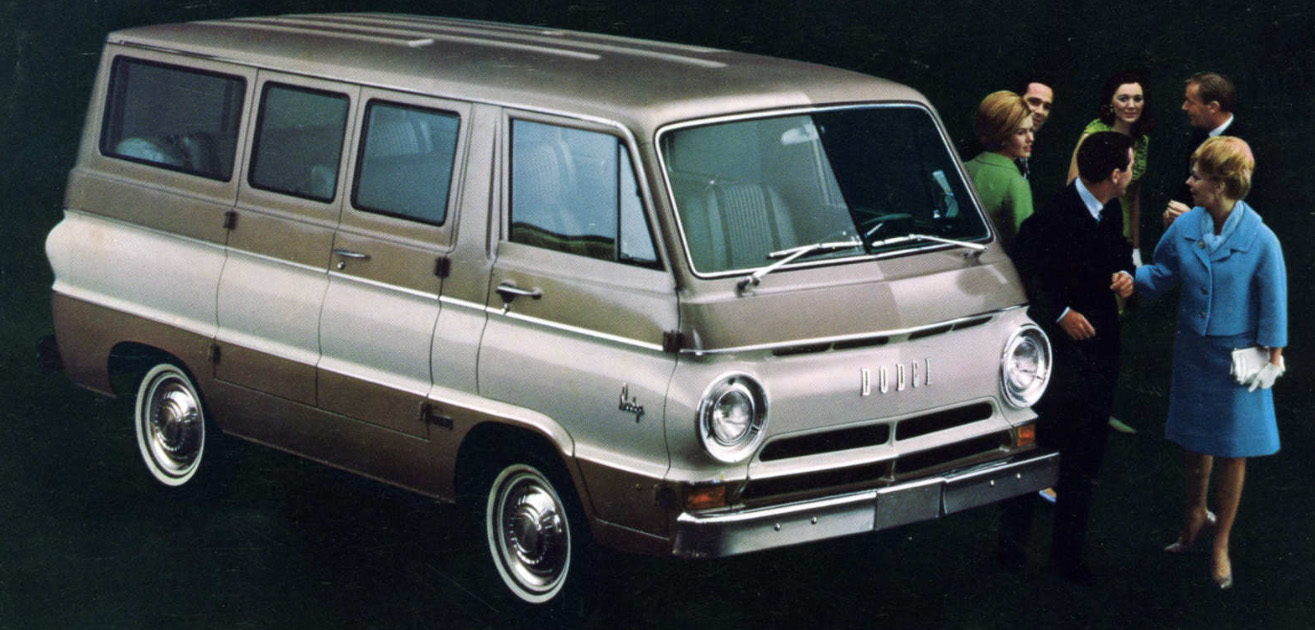
They used a van.
Well, more specially, the used the pickup truck variant of their A100 van, which was one of the compact cab-over vans introduced in the 1960s, like the Ford Econoline or the Corvair Greenbriar, that was designed to compete with Volkswagen’s Type 2 vans and pickup trucks.
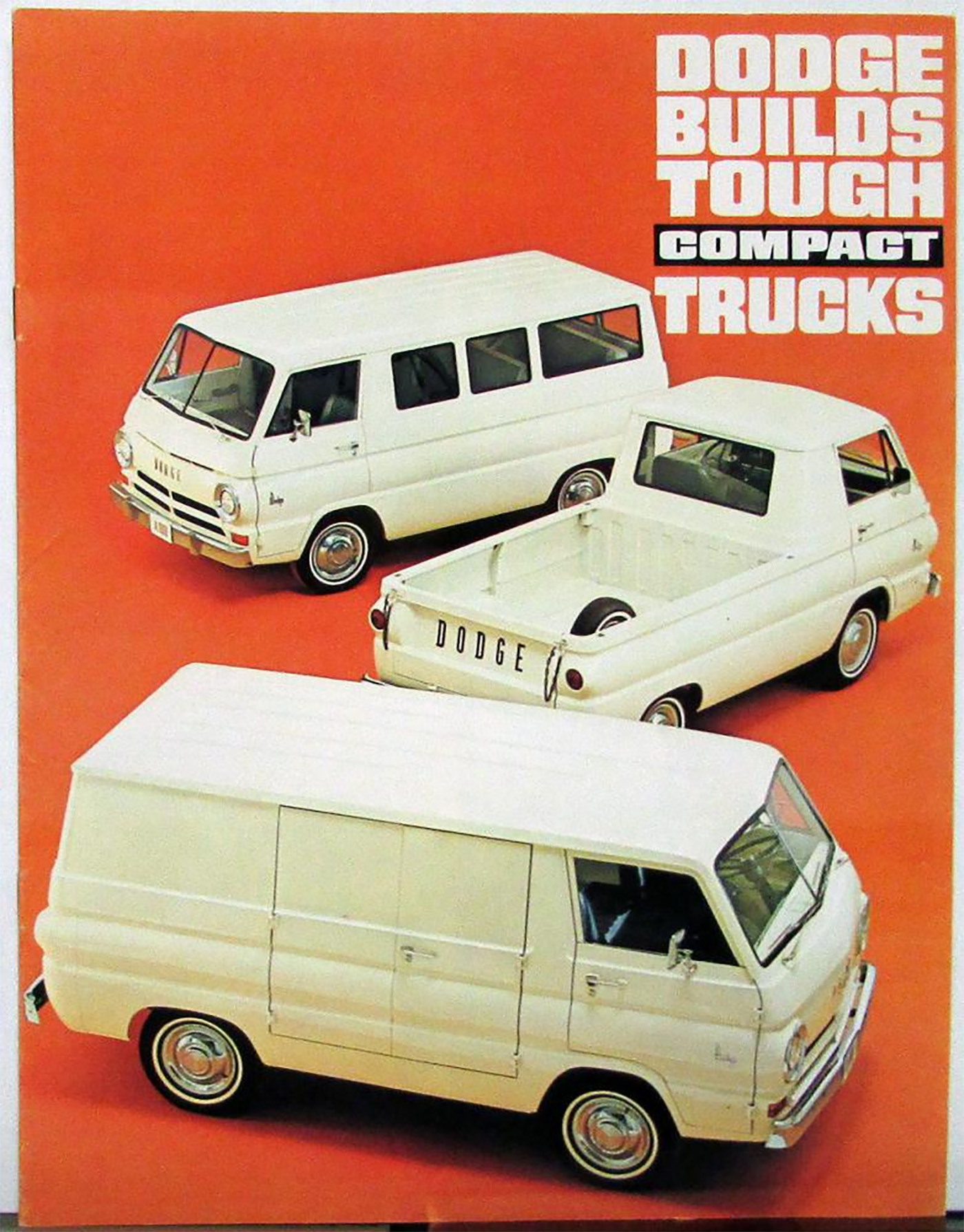
These compact vans and trucks were pretty great at what they did, but “what they did” was never really intended to be the cab of a much larger truck. Still, Chrysler wasn’t really in a position to be picky, so they just sort of plopped the pickup truck cab variant (as that one already had a, you know, closed back) right onto the chassis of their medium-duty truck, creating the Dodge L600 and L700 Tilt Cab:
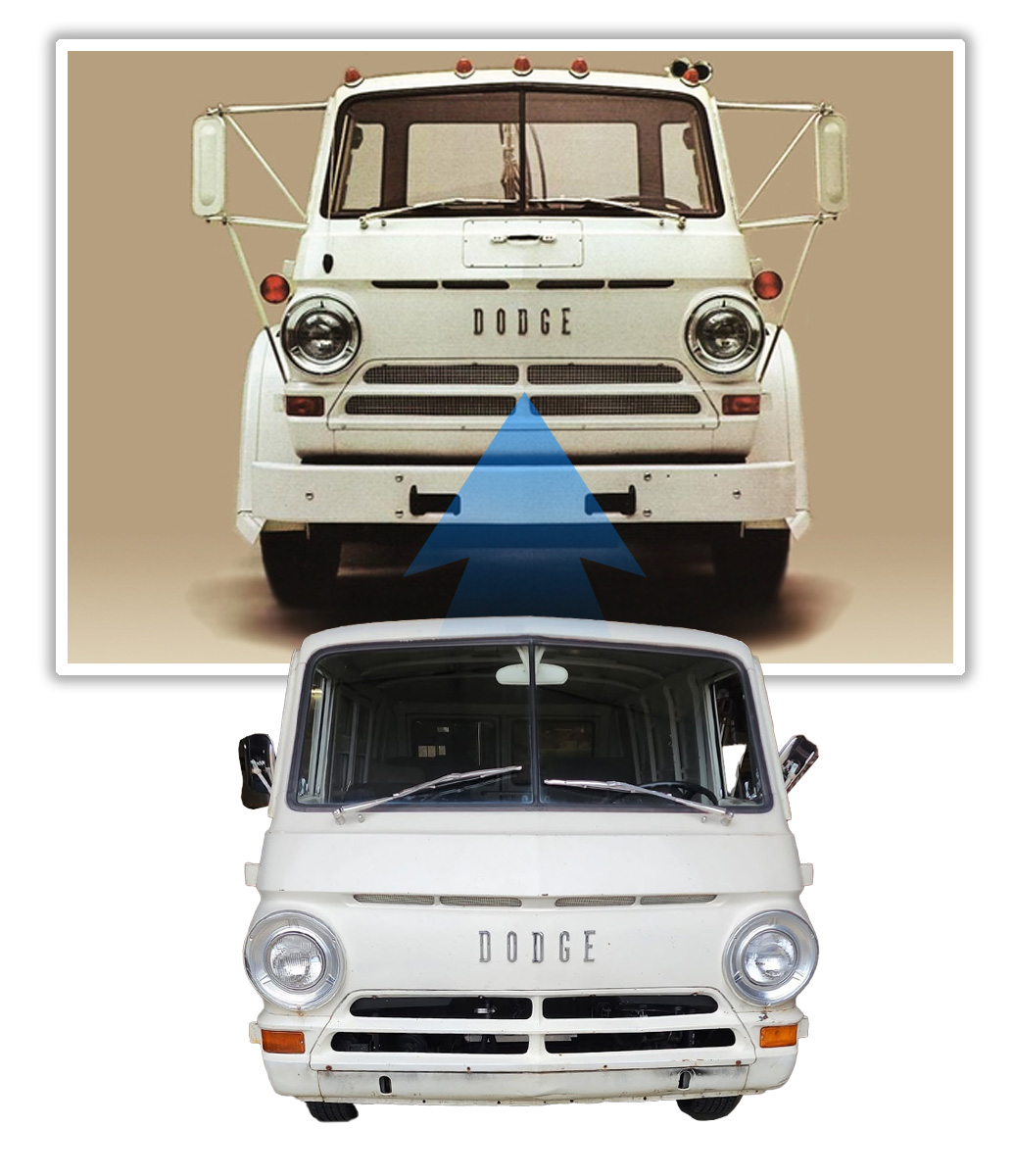
Look at that! They just dropped it between the wheels there, added some external front fenders, cut a pretty crude-looking access panel under the windshield (I believe for access to radiator, brake fluid, probably washer fluid) and called it a day. You could get these trucks in either gas or diesel versions, with gas engines starting with a 255 cubic inch Slant Six, then V8s in 318, 361, and 413 cube sizes. The one diesel was a Cummins V8.
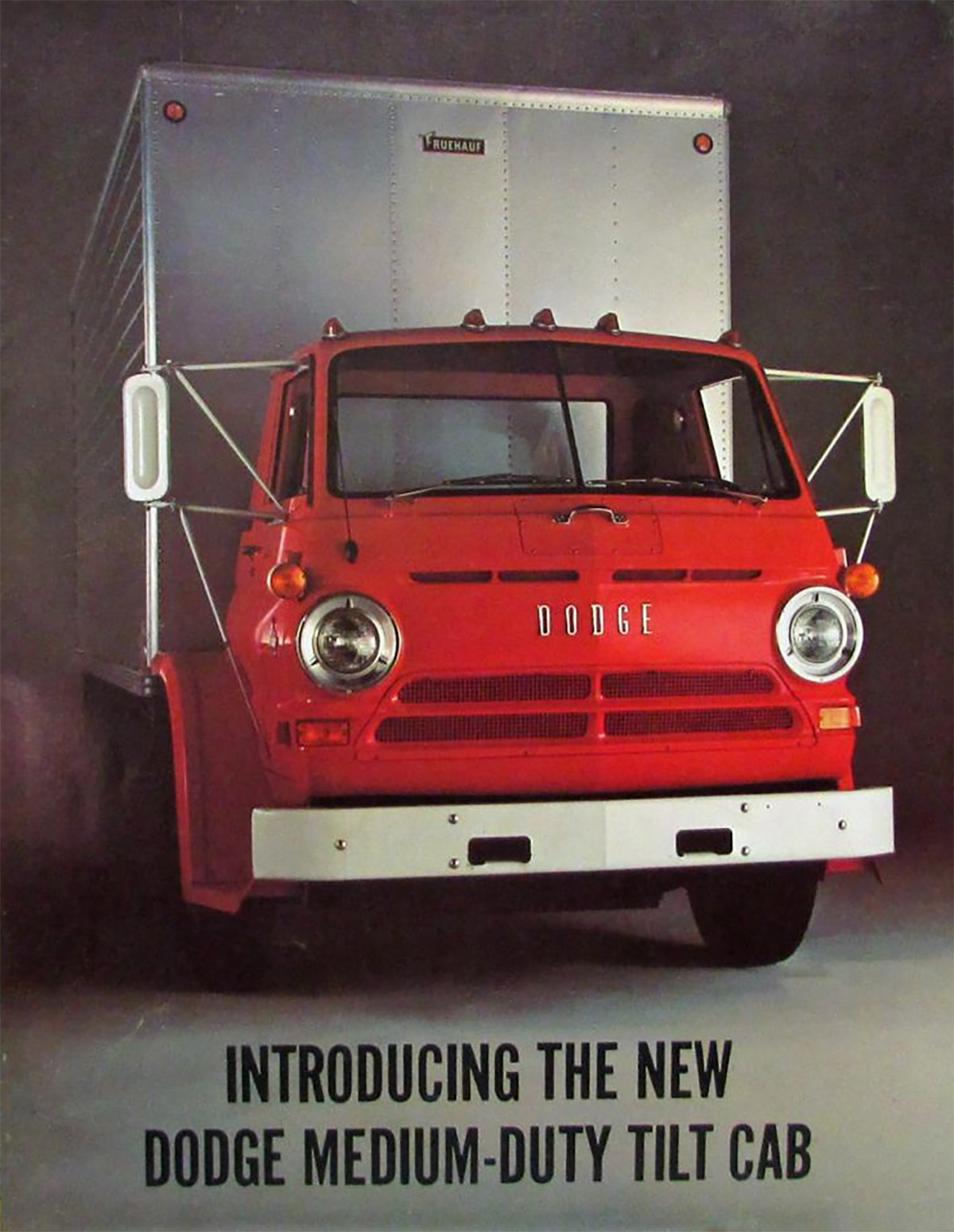
I know there’s people out there who think the result looks awkward, and it’s true that these didn’t sell anywhere near the numbers of the Ford C-Series, but overall? I think Dodge did pretty damn well considering what they had to work with. The cab was reasonably roomy, and I don’t think it looks too out of place on the larger chassis; maybe it’s because the van always had kind of exaggerated features, like those huge trim rings around the headlamps.
So, sure, I guess this is still technically an example of phoning it in, but I think it’s also an example of being resourceful in the face of limitations, and I think it showed off Mopar’s ability to make something work, even when situations weren’t ideal.
I’m not sure I’ve ever actually seen one of these in person, but I hope to one day. Until then, I suggest we all sit back and enjoy this somewhat unhinged Dodge dealer training filmstrip that makes far more use of guns than you’d think was likely:
Ah, America!

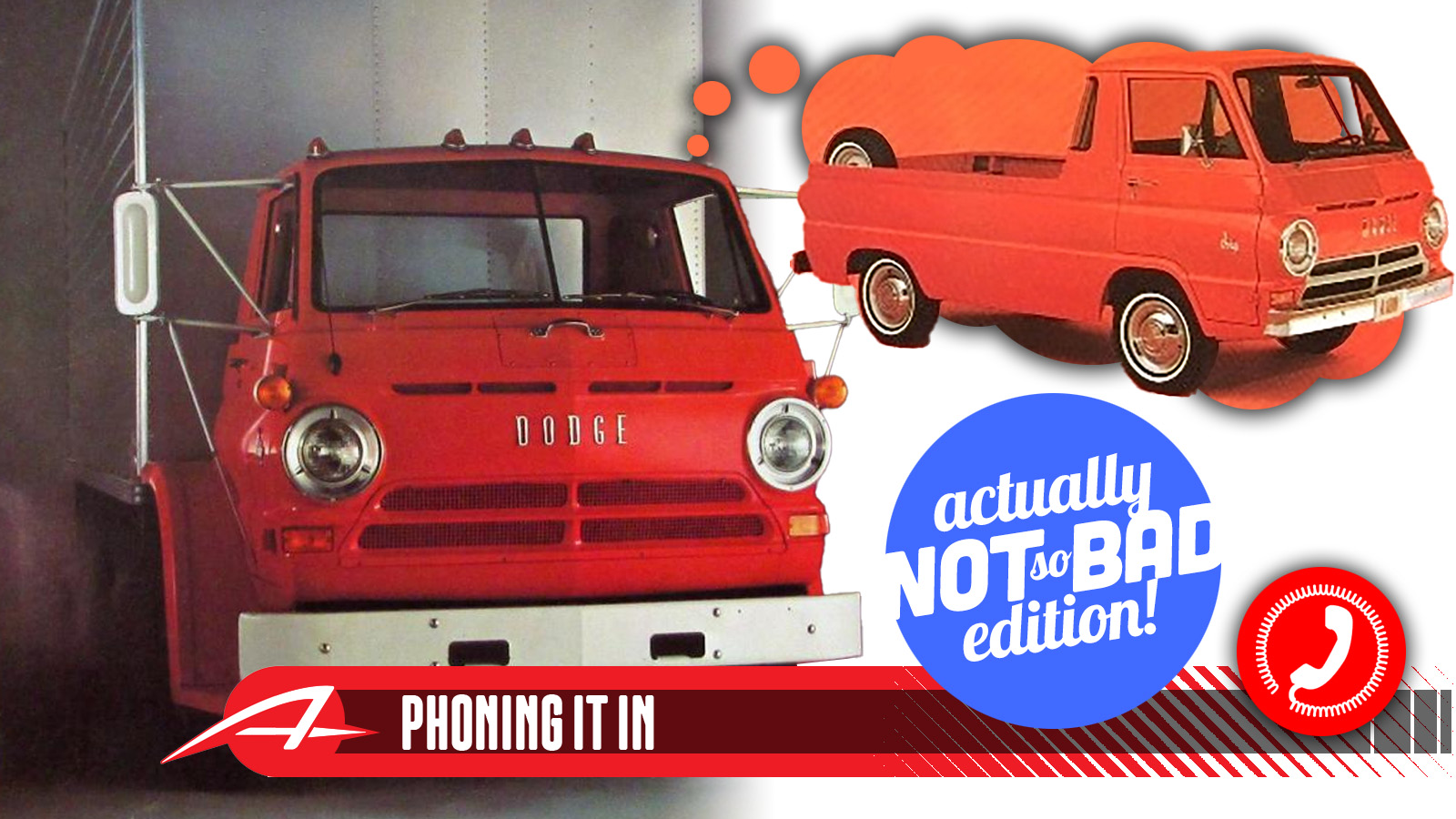






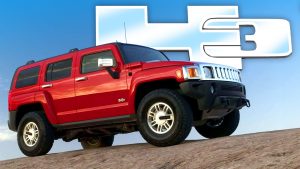
As an aside, it must have been living hell to have to remove the engine from that A100 truck.
I don’t believe it’s an access panel under the windshield; it’s reinforced sheet metal panel for the “tilt-cab” pull handle. You’d have to leverage your entire weight off the bumper to get the initial momentum/lift, which likely could have either pulled the handle out of the thin metal, or at least bent it.
It actually looks better than the A100 Van did with those massive surprised face headlight bezels. I am not sure I feel like the GM equivalent Vikings were any better. in fact I kind of thing the 59/60 versions were pretty bad as they just enlarged the grill and stretched the front edges of the fenders down.
I’ve always seen it as either one of these Dodge A100’s, or the Chevy G10. Definitely not a VW Bus like so many people have always associated the Mystery Machine with.
My young daughter is super into Scooby Doo right now, so I have done lots of recent scrutinizing of that little van while watching it with her!
I feel like these cabover Dodge vans were discussed before, as the possible basis for the “Mystery Machine” of Scooby-Doo fame. I’m too tired to look at the moment, though (cancer sucks!) so I hope someone backfills for me.
But also, these are the kind of van conversions I was talking about when I was talking about ambulances in another article!
Volkswagen do Brazil had big (for us) trucks that had cabs derived from a German light commercial van, the LT (predecessor of the Crafter). And, funny thing is, VW do B started the truck line after acquiring the Brazilian operations of… Chrysler!
I don’t know how related those were, if at all. But it is a neat coincidence that Chrysler did this years earlier. Also, this thing is really cute, I want to hug it (but at a safe speed, I’m not inviting the universe to flatten me under one of these!)
I imagine the headlights are perfectly in line with your rear view mirror.
I miss plain, round, cheap and easy-to-replace round sealed-beam headlights. They look good (to me). The base version of the new Toyota Land Cruiser w/the round lights is the only one to get. Part of an NA Miata’s charm is the round pop-up lights (they always look awful when changed to something else). I know sealed-beam halogens have been surpassed performance-wise by LEDs, but couldn’t manufacturers sort of settle on round LEDs that aren’t part of a big, expensive multi-thousand-dollar assembly? A neighbor spent over two grand to replace one headlight on his BMW. I see that some Audi lights are over $8,000. per assembly, because of lasers or photon torpedos or something. Who’s going to pay to keep fixing these cars when they get old?
I agree with the styling of round headlights, and pop ups in particular are great!
But, my understanding for why they moved away is due to aerodynamics first and foremost. A uniquely styled headlight that fits the form of the vehicle is far more aerodynamic than trying to fit a large round sealed beam into the front a car. The other point is it gave more styling freedom in general to the OEMs to differentiate their products.
So we get better fuel economy but always have that threat of a crazy high price for a new headlight assembly.
In addition to aerodynamics I think that pedestrian safety also nixed the pop-ups. BTW I loved the ones on our X1/9.
Jaguar E-type or Nissan 240z with the aerodynamic plexiglass covers. Done.
Yes, the faired-in lights look fantastic almost always. Especially on a Citroen. 🙂
Sure, someone just needs to make a standardized 7″ round that is actually competitive with modern headlights though. I have Holley Retrobrights on my truck; while they are better than classic halogens, I don’t feel like they are worth the over $200ea they cost. They are probably the “best” sealed beam replacements you can get that still look vintage but they just don’t hold a candle to almost any modern headlights. On the other hand my lowly Mazda absolutely mops the floor with the Retrobrights and you can even get a fully assembly replacement for about $650ea. It doesn’t sound like a horrible deal considering it also includes aiming, leveling, etc and put out WAY more light.
CandlePowerForums (yes, there are forums for light and lighting enthusiasts, and no, they don’t like it when you constantly mention Ra, Inti, Sol, Helios, and other solar-oriented deities) constantly suggests the Koito or Cibie as the two best sealed-beam offerings, short of some really expensive (and really ugly) LED offerings. The Cibies are hard to get now, and it seems like Koito H4s have become the standard recommendation. I’ve got some for my ’65 Suburban, but haven’t installed them yet. Cost me like $40 for the pair of them from CruiserTeq, and it included a wiring kit to bypass having to run full voltage through the switch.
Doughnut, just to give credit where it’s due, I’ve bookmarked (gloveboxed?) your post because it contains info useful to me. Thanks! 🙂
I always thought these look like a frog.
I’m always more impressed with a company making something good with limited resources and repurposing than a dedicated design team and more or less unlimited budget.
Always! Every time!
That dealer promo film is gold! The music! And the narration reminds me of the Turboencabulator.
I wonder what he venn diagram for overlap between Dodge marketing executives and NRA membership was based on that training video.
It wasn’t as much a Venn diagram as it was a circle. I also feel like I can smell the video. I can imagine that it was at least a 2-cigarette endeavor to get through.
A lot of snotty judgement here maybe take it back s notch
Plus the smiling leggy gal in Nancy Sinatra boots!
Yeah… that was impossible to miss. She could walk all over anyone.
And I really did feel sorry for her. She’s a few years older than me. I hope she’s well and was adequately compensated.
What exactly would adequate compensation be for a dealer sales filmstrip in 1970? Minimum wage was $1.60 at the time, so I’m guessing she received $12.80 plus a dozen or so ass-grabs and one or two titty-honks.
Which is absolutely 100% too much T&A grabbing. I just don’t think that stuff is any fun for the recipient under most circumstances. But I guess that was kind of the end of the Mad Men era, so I wouldn’t be surprised.
Ford actually tried this around the same time using the first-gen Econoline pickup cab for a prototype. Can’t find a pick online, but it’s in Wagner’s Crestline Ford Trucks book. Great minds…
The irony is the C-Liner would long outlast these L series. I can remember our local dealer, Cliff Heath Ford still getting one in occasionally in the mid 70s.
The C-Series was in production all the way to 1990. 35 years later, you STILL occasionally see one in commercial use, they did seem to hold up
Fair amount of c-series fire trucks still out there.
I saw one being used by a ready mix concrete company recently, they really seem to last
I read that as Heathcliff Ford and thought of the cartoon cat.
This Dodge actually works really well and the fender flares give it kind of a wide body tuner car look. But looking at the Ford C-Series I found the H-Series, which certainly was phoning it in badly. Although at least they put a handle on the scalloped blank for the old wheel arch to make that look somewhat intentional.
Recently I have seen that VW owned International is using prior generation GM pickup cabs on its CV medium duty trucks.
I had a Matchbox model of the Dodge with a stake body.
A lot of medium duty trucks used a pickup cab with a different hood, including Dodge so there was precedent. Peterbilt did the same thing in the 90s with 200 cabover that used a modified Volkswagen LT cab. It was less obvious because the donor wasn’t sold in the US.
I just remembered the Chevrolet Kodiak from the oughts used a reworked Express van cab, and overseas Ford used the Transit cab for the A series and Dodge themselves used the Tradesman van as the cab for the 50 Series, although this wasn’t a tilt cab
Van cabs work much better for this than the pickup cabs. None come close to the spaciousness of a ground-up design, but at least the van has the right ergonomics.
I’ve ridden/driven both the Express and GMT400-based Kodiak/Topkick, and the GMT was by far the worst. The cab is so small, the dash too high and forward, and you’ve got an unnecessary transmission tunnel. GM had to modify the roof with a silly hump to get enough headroom.
The Express cab version had to contend with the dog house, (also superfluous) but at least the floor was flat, and the cabin tall enough for a proper seating position.
Generally, every medium duty truck produced by the Big 3 is kind of a half-assed POS. The Ford 6/750 as well as the International CV are awful compared to other vocational trucks.
I forgot about the Kodiak! I always thought those twucks looked cool.
The Matchbox Dodge Stake Truck you mention is actually NOT the same truck as the Dodge in this story. It’s actually a European designed Dodge truck that wasn’t sold in the North American market. Interestingly, Matchbox did have many American big trucks in its various series, both the 1-75 and the larger King-size/Super King series.
The “expression” on that cab’s anthropomorphized face seems to indicate it received a much bigger load from behind than it was used to taking.
I’ve seen one of these that was a fire engine. I can’t remember where maybe carlisle. My uncle had one for his moving company at one point too but I don’t remember seeing it. My dad grandfather and him would often talk about it being problematic. Even years after he got rid of it. But that just could have been because it was a coe.
The pickup version of the A-series was never anywhere close to a mainstream pickup, they sold in dismal numbers compared to the other van based pickups which were a tiny niche compared to conventional trucks.
Ford didn’t spend a lot of money on the C-Series cab, they purchased it from the Budd company, if I remember right, as did Mack and I think a few Fire Truck manufactures too.
The use of the same basic cabs on MD trucks was quite common with the MD version often outlasting the LD truck it came from.
“Some referred to the Ford tilt-cab as the “Budd” cab, implying it was an off-the-shelf item available to anyone. However, the C-series cab was designed by Ford, tooled at its own expense and built by the Budd Company to Ford Motor Company specifications. Other truck manufacturers had to obtain Ford approval before purchasing it. The exception was Mack, which bought most of the major cab stampings from Budd and assembled them itself on a floor pan of its own design. ”
https://en.wikipedia.org/wiki/Ford_C_series#Usage_by_other_manufacturers
Seeing that Dodge van “face” without all the chrome makes me realize how similar it is to the much later Neon (especially the SRT4), as if it’s saying “Hi” via time travel.
Lindberg Models once did a 1/25 scale model kit of this, which has pretty good availability thanks to multiple reissues through the past decade. It’s most frequently seen pulling a 1/25 scale car carrier loaded with muscle-era Mopars.
I have one of these, and yep, made it look beat to hell and chopped the trailer length down to pup length so a prowler could hauled.
Ford did the same thing, just bigger. They re-purposed the C-series cab into the “2-Story Falcon” class 8 semi-tractor’s cab.
IIRC, GM did it too, though maybe not all the way up to Class 8. Was definitely a thing back then for the Detroit 3.
“crude-looking access panel”
To me it looks like a riveted strengthening plate for a handle to tip the cab?
You say it’s phoning it in and I say it’s a smart way to save on tooling costs.
I said I respected it!
Ford did that as well with the European Transit Mk2 cab only slightly modified, on the A series trucks: https://en.m.wikipedia.org/wiki/Ford_A_series
And M.A.N used the classic VW LT cab for many years:
https://www.bigmacktrucks.com/topic/35895-from-lt-to-worker-volkswagen’s-versatile-long-lasting-“lt”-cab/
I guess Dodge was… not throwing away their shot?
Lin Manuel, your Mystery Machine is waiting!
I commented about these in one of Mercedes’ posts, so I’m surprised she didn’t write this one. These are pretty well documented at Curbside Classic.
Probably the post about the Mexican market Dodge medium duty trucks since they used the same cab and nose as Ram pickups too.
Yes, that. Thanks
The camper is kinda cool. But would be better digg to h the muti window version. Mercedes: find one and add it to your fleet